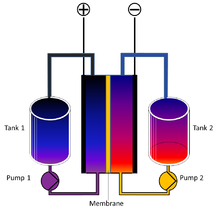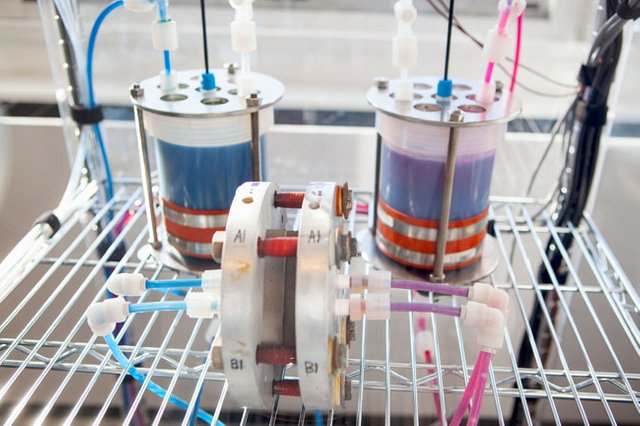New Battery Tech Could run for over a Decade with Minimal Cost and Maintenance
One of the biggest problems with alternative energy sources such as wind and solar is that they only produce intermittent energy. In addition, if that energy is not used right away, it has generally been expensive and inefficient to store it. If batteries can be built to store energy for under $100 per kilowatt-hour, these alternative energy sources immediately become competitive with traditional power plants.
Recent discoveries by researchers from the Harvard John A. Paulson School of Engineering and Applied Sciences (SEAS) may be able to do just that. They have developed a new non-toxic and non-corrosive flow battery with a very long lifespan that can store energy in organic molecules dissolved in water. And because the electrolytes are similar to salt water, these batteries should also be much cheaper to produce:
"Because we were able to dissolve the electrolytes in neutral water, this is a long-lasting battery that you could put in your basement," said Gordon. "If it spilled on the floor, it wouldn't eat the concrete and since the medium is noncorrosive, you can use cheaper materials to build the components of the batteries, like the tanks and pumps."
Like fuel cells, instead of holding chemical fluids inside the battery itself, flow batteries store energy in external tanks that hold these chemical fluids. As a result, energy can be stored at lower cost than traditional batteries, and the energy potential is limited only by the size of the tanks.
To solve the problem, the researchers figured out why the molecules were not working as necessary, and they tweaked the molecules' structures to function as required. If you really think about it, the possibilities of this type of "tweaking" are astounding. How many other problems may be solved with a mere twist and tweak of a chemical bond:
The key to designing the battery was to first figure out why previous molecules were degrading so quickly in neutral solutions, said Eugene Beh, a postdoctoral fellow and first author of the paper. By first identifying how the molecule viologen in the negative electrolyte was decomposing, Beh was able to modify its molecular structure to make it more resilient.
Next, the team turned to ferrocene, a molecule well known for its electrochemical properties, for the positive electrolyte. "Ferrocene is great for storing charge but is completely insoluble in water," said Beh. "It has been used in other batteries with organic solvents, which are flammable and expensive." But by functionalizing ferrocene molecules in the same way as with the viologen, the team was able to turn an insoluble molecule into a highly soluble one that could also be cycled stably. "Aqueous soluble ferrocenes represent a whole new class of molecules for flow batteries," said Aziz.
As a result of these modifications to the electrolytes, the Harvard team was able to engineer a battery that loses only one percent of its capacity per 1000 charge/discharge cycles. By comparison, lithium ion batteries are often dead by the time they reach 1000 complete cycles. And by using a flow battery configuration, peak power levels are decoupled from the peak energy storage capacity. This is much more cost effective from a storage standpoint. If a wind turbine has a 1 megawatt capacity, but you want to store 50 megawatts of power, it would be overkill to purchase batteries with 50 megawatts of power capacity. To clarify, these new long-lasting and comparatively inexpensive flow cells can be designed to store 50 megawatts of power, but offer 1 megawatt of peak power capacity.
The researchers are now working with several companies to scale the technology, and to optimize the design.
Link: Long-lasting flow battery could run for more than a decade with minimum upkeep
Research Publication: A Neutral pH Aqueous Organic/Organometallic Redox Flow Battery with Extremely High Capacity Retention


Berkshire Hathaway has made huge investments into battery technology in China. The storage and distribution of energy is seeming to cut new ground. The resistivity of transport materials ought to be on the same platform. We cannot afford gold so is there a different medium along the fibre-optic/plasma axis?
invest in canned beans! lol
Link: Extreme Cold Hitting Europe Creating Food Shortages and Rationing
Link: Gold, Dow, and the Numbers
This article (posted today by @krnel) may be of interest as well:
Link: Flow Cell Rechargeable Battery Converts Waste CO2 into Electricity
Great news, especially for off-grid living if this tech can be produced cheaply at small scale. With Elon Muck's plan for worldwide high-speed Internet at the conceptual level, it's only a matter of time before telecommuters can live in plots of land where almost no-one could make a normal living. You know: those multi-acre parcels that sell cheaply because there are no jobs in the vicinity...
I've thought the same thing for a while now as well. "City Living" may become increasingly irrelevent, especially once you can also put on a simple headset and "appear" to be anywhere in the world in an instant. Once those low-orbit satellites are in place, and with tech like this, it may soon be a whole new game. time to buy up that all that cheap beautiful land in the middle of nowhere lol
That's exactly what I was thinking. Makes for a rare bird: a techno-optimist prepper!
Great post @alexpmorris, I shared it on twitter for you:
https://twitter.com/VTCWhale/status/830247859580710913
Wow somebody added this in the post promotion. Nice catch :)